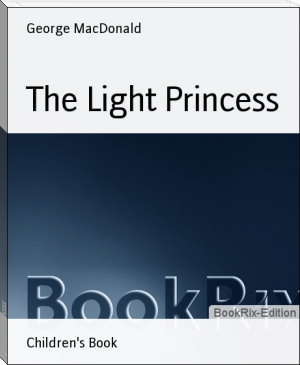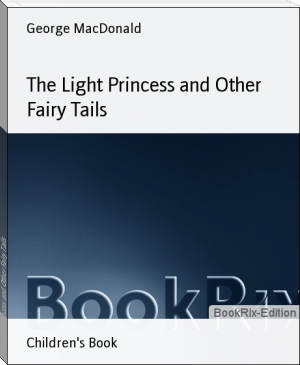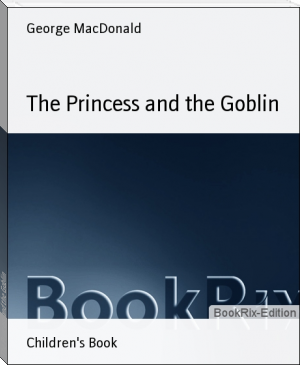The Light Princess by George MacDonald (best love story novels in english txt) 📕

- Author: George MacDonald
Book online «The Light Princess by George MacDonald (best love story novels in english txt) 📕». Author George MacDonald
arms nor their hearts ache. And she was so nice to play at ball with! There was positively no danger of letting her fall. They might throw her down, or knock her down, or push her down, but couldn't let her down. It is true, they might let her fly into the fire or the coal-hole, or through the window; but none of these accidents had happened as yet. If you heard peals of laughter resounding from some unknown region, you might be sure enough of the cause. Going down into the kitchen, or the room, you would find Jane and Thomas, and Robert and Susan, all and sum, playing at ball with the little princess. She was the ball herself, and did not enjoy it the less for that. Away she went, flying from one to another, screeching with laughter. And the servants loved the ball itself better even than the game. But they had to take some care how they threw her, for if she received an upward direction, she would never come down again without being fetched.
5. What Is to Be Done?
But above-stairs it was different. One day, for instance, after breakfast, the king went into his counting-house, and counted out his money. The operation gave him no pleasure.
"To think," said he to himself, "that every one of these gold sovereigns weighs a quarter of an ounce, and my real, live, flesh-and-blood princess weighs nothing at all!"
And he hated his gold sovereigns, as they lay with a broad smile of self-satisfaction all over their yellow faces.
The queen was in the parlour, eating bread and honey. But at the second mouthful she burst out crying, and could not swallow it.
The king heard her sobbing. Glad of anybody, but especially of his queen, to quarrel with, he clashed his gold sovereigns into his money-box, clapped his crown on his head, and rushed into the parlour.
"What is all this about?" exclaimed he. "What are you crying for, queen?"
"I can't eat it," said the queen, looking ruefully at the honey-pot.
"-No wonder!" retorted the king. "You've just eaten your breakfast -two turkey eggs, and three anchovies."
"Oh, that's not it!" sobbed her Majesty. "It's my child, my child!"
"Well, what's the matter with your child? She's neither up the chimney nor down the draw-well. Just hear her laughing."
Yet the king could not help a sigh, which he tried to turn into a cough, saying-
"It is a good thing to be light-hearted, I am sure, whether she be ours or not."
"It is a bad thing to be light-headed," answered the queen, looking with prophetic soul far into the future.
"'Tis a good thing to be light-handed," said the king.
"'Tis a bad thing to be light-fingered," answered the queen.
"'Tis a good thing to be light-footed," said the king.
"'Tis a bad thing-" began the queen; but the king interrupted her.
"In fact," said he, with the tone of one who concludes an argument in which he has had only imaginary opponents, and in which, therefore, he has come off triumphant-"in fact, it is a good thing altogether to be light-bodied."
"But it is a bad thing altogether to be light- minded," retorted the queen, who was beginning to lose her temper.
This last answer quite discomfited his Majesty, who turned on his heel, and betook himself to his counting-house again. But he was not half-way towards it, when the voice of his queen overtook him.
"And it's a bad thing to be light-haired," screamed she, determined to have more last words, now that her spirit was roused.
The queen's hair was black as night; and the king's had been, and his daughter's was, golden as morning. But it was not this reflection on his hair that arrested him; it was the double use of the word light. For the king hated all witticisms, and punning especially. And besides, he could not tell whether the queen meant light-haired or light-heired; for why might she not aspirate her vowels when she was exasperated herself?
He turned upon his other heel, and rejoined her. She looked angry still, because she knew that she was guilty, or, what was much the same, knew that HE thought so.
"My dear queen," said he, "duplicity of any sort is exceedingly objectionable between married people of any rank, not to say kings and queens; and the most objectionable form duplicity can assume is that of punning."
"There!" said the queen, "I never made a jest, but I broke it in the making. I am the most unfortunate woman in the world!"
She looked so rueful, that the king took her in his arms; and they sat down to consult.
"Can you bear this?" said the king.
"No, I can't," said the queen.
"Well, what's to be done?" said the king.
"I'm sure I don't know," said the queen. "But might you not try an apology?"
"To my old sister, I suppose you mean?" said the king.
"Yes," said the queen.
"Well, I don't mind," said the king.
So he went the next morning to the house of the princess, and, making a very humble apology, begged her to undo the spell. But the princess declared, with a grave face, that she knew nothing at all about it. Her eyes, however, shone pink, which was a sign that she was happy. She advised the king and queen to have patience, and to mend their ways. The king returned disconsolate. The queen tried to comfort him.
"We will wait till she is older. She may then be able to suggest something herself. She will know at least how she feels, and explain things to us."
"But what if she should marry?" exclaimed the king, in sudden consternation at the idea.
"Well, what of that?" rejoined the queen. "Just think! If she were to have children! In the course of a hundred years the air might be as full of floating children as of gossamers in autumn."
"That is no business of ours," replied the queen. "Besides, by that time they will have learned to take care of themselves."
A sigh was the king's only answer.
He would have consulted the court physicians; but he was afraid they would try experiments upon her.
6. She Laughs Too Much.
Meantime, notwithstanding awkward occurrences, and griefs that she brought upon her parents, the little princess laughed and grew-not fat, but plump and tall. She reached the age of seventeen, without having fallen into any worse scrape than a chimney; by rescuing her from which, a little bird-nesting urchin got fame and a black face. Nor, thoughtless as she was, had she committed anything worse than laughter at everybody and everything that came in her way. When she was told, for the sake of experiment, that General Clanrunfort was cut to pieces with all his troops, she laughed; when she heard that the enemy was on his way to besiege her papa's capital, she laughed hugely; but when she was told that the city would certainly be abandoned to the mercy of the enemy's soldiery-why, then she laughed immoderately. She never could be brought to see the serious side of anything. When her mother cried, she said,-
"What queer faces mamma makes! And she squeezes water out of her cheeks? Funny mamma!"
And when her papa stormed at her, she laughed, and danced round and round him, clapping her hands, and crying-
"Do it again, papa. Do it again! It's SUCH fun! Dear, funny papa!"
And if he tried to catch her, she glided from him in an instant, not in the least afraid of him, but thinking it part of the game not to be caught. With one push of her foot, she would be floating in the air above his head; or she would go dancing backwards and forwards and sideways, like a great butterfly. It happened several times, when her father and mother were holding a consultation about her in private, that they were interrupted by vainly repressed outbursts of laughter over their heads; and looking up with indignation, saw her floating at full length in the air above them, whence she regarded them with the most comical appreciation of the position.
One day an awkward accident happened. The princess had come out upon the lawn with one of her attendants, who held her by the hand. Spying her father at the other side of the lawn, she snatched her hand from the maid's, and sped across to him. Now when she wanted to run alone, her custom was to catch up a stone in each hand, so that she might come down again after a bound. Whatever she wore as part of her attire had no effect in this way: even gold, when it thus became as it were a part of herself, lost all its weight for the time. But whatever she only held in her hands retained its downward tendency. On this occasion she could see nothing to catch up but a huge toad, that was walking across the lawn as if he had a hundred years to do it in. Not knowing what disgust meant, for this was one of her peculiarities, she snatched up the toad and bounded away. She had almost reached her father, and he was holding out his arms to receive her, and take from her lips the kiss which hovered on them like a butterfly on a rosebud, when a puff of wind blew her aside into the arms of a young page, who had just been receiving a message from his Majesty. Now it was no great peculiarity in the princess that, once she was set agoing, it always cost her time and trouble to check herself. On this occasion there was no time. She must kiss-and she kissed the page. She did not mind it much; for she had no shyness in her composition; and she knew, besides, that she could not help it. So she only laughed, like a musical box. The poor page fared the worst. For the princess, trying to correct the unfortunate tendency of the kiss, put out her hands to keep her off the page; so that, along with the kiss, he received, on the other cheek, a slap with the huge black toad, which she poked right into his eye. He tried to laugh, too, but the attempt resulted in such an odd contortion of countenance, as showed that there was no danger of his pluming himself on the kiss. As for the king, his dignity was greatly hurt, and he did not speak to the page for a whole month.
I may here remark that it was very amusing to see her run, if her mode of progression could properly be called running. For first she would make a bound; then, having alighted, she would run a few steps, and make another bound. Sometimes she would fancy she had reached the ground before she actually had, and her feet would go backwards and forwards, running upon nothing at all, like those of a chicken on its back. Then she would laugh like the very spirit of fun; only in her laugh there
5. What Is to Be Done?
But above-stairs it was different. One day, for instance, after breakfast, the king went into his counting-house, and counted out his money. The operation gave him no pleasure.
"To think," said he to himself, "that every one of these gold sovereigns weighs a quarter of an ounce, and my real, live, flesh-and-blood princess weighs nothing at all!"
And he hated his gold sovereigns, as they lay with a broad smile of self-satisfaction all over their yellow faces.
The queen was in the parlour, eating bread and honey. But at the second mouthful she burst out crying, and could not swallow it.
The king heard her sobbing. Glad of anybody, but especially of his queen, to quarrel with, he clashed his gold sovereigns into his money-box, clapped his crown on his head, and rushed into the parlour.
"What is all this about?" exclaimed he. "What are you crying for, queen?"
"I can't eat it," said the queen, looking ruefully at the honey-pot.
"-No wonder!" retorted the king. "You've just eaten your breakfast -two turkey eggs, and three anchovies."
"Oh, that's not it!" sobbed her Majesty. "It's my child, my child!"
"Well, what's the matter with your child? She's neither up the chimney nor down the draw-well. Just hear her laughing."
Yet the king could not help a sigh, which he tried to turn into a cough, saying-
"It is a good thing to be light-hearted, I am sure, whether she be ours or not."
"It is a bad thing to be light-headed," answered the queen, looking with prophetic soul far into the future.
"'Tis a good thing to be light-handed," said the king.
"'Tis a bad thing to be light-fingered," answered the queen.
"'Tis a good thing to be light-footed," said the king.
"'Tis a bad thing-" began the queen; but the king interrupted her.
"In fact," said he, with the tone of one who concludes an argument in which he has had only imaginary opponents, and in which, therefore, he has come off triumphant-"in fact, it is a good thing altogether to be light-bodied."
"But it is a bad thing altogether to be light- minded," retorted the queen, who was beginning to lose her temper.
This last answer quite discomfited his Majesty, who turned on his heel, and betook himself to his counting-house again. But he was not half-way towards it, when the voice of his queen overtook him.
"And it's a bad thing to be light-haired," screamed she, determined to have more last words, now that her spirit was roused.
The queen's hair was black as night; and the king's had been, and his daughter's was, golden as morning. But it was not this reflection on his hair that arrested him; it was the double use of the word light. For the king hated all witticisms, and punning especially. And besides, he could not tell whether the queen meant light-haired or light-heired; for why might she not aspirate her vowels when she was exasperated herself?
He turned upon his other heel, and rejoined her. She looked angry still, because she knew that she was guilty, or, what was much the same, knew that HE thought so.
"My dear queen," said he, "duplicity of any sort is exceedingly objectionable between married people of any rank, not to say kings and queens; and the most objectionable form duplicity can assume is that of punning."
"There!" said the queen, "I never made a jest, but I broke it in the making. I am the most unfortunate woman in the world!"
She looked so rueful, that the king took her in his arms; and they sat down to consult.
"Can you bear this?" said the king.
"No, I can't," said the queen.
"Well, what's to be done?" said the king.
"I'm sure I don't know," said the queen. "But might you not try an apology?"
"To my old sister, I suppose you mean?" said the king.
"Yes," said the queen.
"Well, I don't mind," said the king.
So he went the next morning to the house of the princess, and, making a very humble apology, begged her to undo the spell. But the princess declared, with a grave face, that she knew nothing at all about it. Her eyes, however, shone pink, which was a sign that she was happy. She advised the king and queen to have patience, and to mend their ways. The king returned disconsolate. The queen tried to comfort him.
"We will wait till she is older. She may then be able to suggest something herself. She will know at least how she feels, and explain things to us."
"But what if she should marry?" exclaimed the king, in sudden consternation at the idea.
"Well, what of that?" rejoined the queen. "Just think! If she were to have children! In the course of a hundred years the air might be as full of floating children as of gossamers in autumn."
"That is no business of ours," replied the queen. "Besides, by that time they will have learned to take care of themselves."
A sigh was the king's only answer.
He would have consulted the court physicians; but he was afraid they would try experiments upon her.
6. She Laughs Too Much.
Meantime, notwithstanding awkward occurrences, and griefs that she brought upon her parents, the little princess laughed and grew-not fat, but plump and tall. She reached the age of seventeen, without having fallen into any worse scrape than a chimney; by rescuing her from which, a little bird-nesting urchin got fame and a black face. Nor, thoughtless as she was, had she committed anything worse than laughter at everybody and everything that came in her way. When she was told, for the sake of experiment, that General Clanrunfort was cut to pieces with all his troops, she laughed; when she heard that the enemy was on his way to besiege her papa's capital, she laughed hugely; but when she was told that the city would certainly be abandoned to the mercy of the enemy's soldiery-why, then she laughed immoderately. She never could be brought to see the serious side of anything. When her mother cried, she said,-
"What queer faces mamma makes! And she squeezes water out of her cheeks? Funny mamma!"
And when her papa stormed at her, she laughed, and danced round and round him, clapping her hands, and crying-
"Do it again, papa. Do it again! It's SUCH fun! Dear, funny papa!"
And if he tried to catch her, she glided from him in an instant, not in the least afraid of him, but thinking it part of the game not to be caught. With one push of her foot, she would be floating in the air above his head; or she would go dancing backwards and forwards and sideways, like a great butterfly. It happened several times, when her father and mother were holding a consultation about her in private, that they were interrupted by vainly repressed outbursts of laughter over their heads; and looking up with indignation, saw her floating at full length in the air above them, whence she regarded them with the most comical appreciation of the position.
One day an awkward accident happened. The princess had come out upon the lawn with one of her attendants, who held her by the hand. Spying her father at the other side of the lawn, she snatched her hand from the maid's, and sped across to him. Now when she wanted to run alone, her custom was to catch up a stone in each hand, so that she might come down again after a bound. Whatever she wore as part of her attire had no effect in this way: even gold, when it thus became as it were a part of herself, lost all its weight for the time. But whatever she only held in her hands retained its downward tendency. On this occasion she could see nothing to catch up but a huge toad, that was walking across the lawn as if he had a hundred years to do it in. Not knowing what disgust meant, for this was one of her peculiarities, she snatched up the toad and bounded away. She had almost reached her father, and he was holding out his arms to receive her, and take from her lips the kiss which hovered on them like a butterfly on a rosebud, when a puff of wind blew her aside into the arms of a young page, who had just been receiving a message from his Majesty. Now it was no great peculiarity in the princess that, once she was set agoing, it always cost her time and trouble to check herself. On this occasion there was no time. She must kiss-and she kissed the page. She did not mind it much; for she had no shyness in her composition; and she knew, besides, that she could not help it. So she only laughed, like a musical box. The poor page fared the worst. For the princess, trying to correct the unfortunate tendency of the kiss, put out her hands to keep her off the page; so that, along with the kiss, he received, on the other cheek, a slap with the huge black toad, which she poked right into his eye. He tried to laugh, too, but the attempt resulted in such an odd contortion of countenance, as showed that there was no danger of his pluming himself on the kiss. As for the king, his dignity was greatly hurt, and he did not speak to the page for a whole month.
I may here remark that it was very amusing to see her run, if her mode of progression could properly be called running. For first she would make a bound; then, having alighted, she would run a few steps, and make another bound. Sometimes she would fancy she had reached the ground before she actually had, and her feet would go backwards and forwards, running upon nothing at all, like those of a chicken on its back. Then she would laugh like the very spirit of fun; only in her laugh there
Free e-book «The Light Princess by George MacDonald (best love story novels in english txt) 📕» - read online now
Similar e-books:





Comments (0)